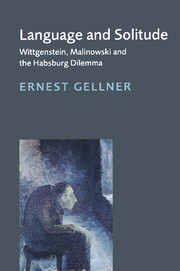Book contents
- Frontmatter
- Contents
- Preface
- Foreword
- Part I The Habsburg dilemma
- Part II Wittgenstein
- Part III Malinowski
- 23 The birth of modern social anthropology
- 24 The Malinowskian revolution
- 25 How did Malinowski get there?
- 26 Whither anthropology? Or: whither Bronislaw?
- 27 The difference between Cracow and Vienna
- 28 Malinowski's achievement and politics
- 29 Malinowski's theory of language
- 30 Malinowski's later mistake
- 31 The (un)originality of Malinowski and Wittgenstein
- Part IV Influences
- Part V Conclusions
- General bibliography
- Bibliographies of Ernest Gellner's writings on Wittgenstein, Malinowski, and nationalism
- Index
25 - How did Malinowski get there?
Published online by Cambridge University Press: 05 March 2010
- Frontmatter
- Contents
- Preface
- Foreword
- Part I The Habsburg dilemma
- Part II Wittgenstein
- Part III Malinowski
- 23 The birth of modern social anthropology
- 24 The Malinowskian revolution
- 25 How did Malinowski get there?
- 26 Whither anthropology? Or: whither Bronislaw?
- 27 The difference between Cracow and Vienna
- 28 Malinowski's achievement and politics
- 29 Malinowski's theory of language
- 30 Malinowski's later mistake
- 31 The (un)originality of Malinowski and Wittgenstein
- Part IV Influences
- Part V Conclusions
- General bibliography
- Bibliographies of Ernest Gellner's writings on Wittgenstein, Malinowski, and nationalism
- Index
Summary
The view widely if tacitly held of Malinowski in the profession was that he arrived from outer space, and that his ideas emerged by a kind of conceptual parthenogenesis, without benefit or need of mundane parentage. This was a view which on the whole he seemed to welcome and encourage. His British or Imperial followers had little knowledge and indeed, so it would seem, little curiosity about his intellectual and other origins. Despite his very profound roots in Cracow and Zakopane, Malinowski eventually came to cut himself off from them. He had at first thought of buying a summer house in Zakopane in the Carpathians whilst continuing to profess in London, but in the end decided to buy one in Alto Adige in Italy instead, which his family still owns. The consequence was that his family grew up between the Italian-controlled South Tyrol and the English-speaking world, without much by way of contact with his own Polish roots. When his most leading disciples came to assemble the posthumous volume Man and Culture, under the editorship of Raymond Firth, his distinguished successor in the LSE chair of social anthropology, the work displayed little knowledge of Malinowski's Polish background and some profound misconceptions concerning its character. One had to wait till the centenary of Malinowski's birth in 1984 and the conferences occasioned by it, and above all the availability of the work of young Polish scholars, mainly in Cracow, before the really fascinating sources of his ideas and attitudes became clear (Ellen et al. 1988).
- Type
- Chapter
- Information
- Language and SolitudeWittgenstein, Malinowski and the Habsburg Dilemma, pp. 123 - 126Publisher: Cambridge University PressPrint publication year: 1998



